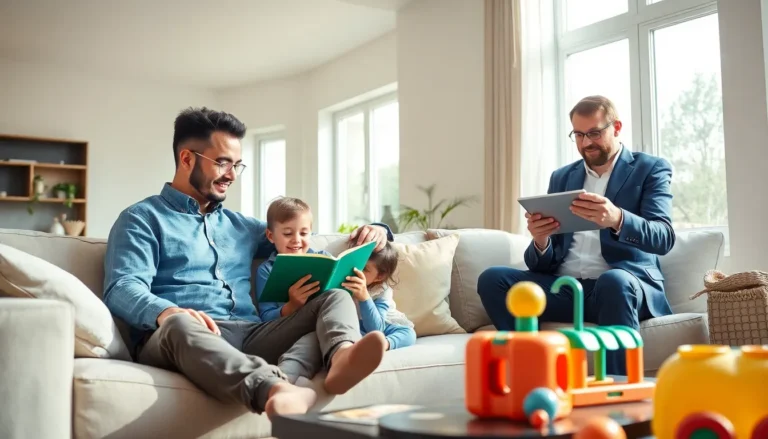Table of Contents
ToggleWhen it comes to raising children alone, you might hear terms like “solo parenting” and “single parenting” tossed around like confetti at a parade. But hold on, these two concepts are not interchangeable. Just like you wouldn’t confuse a cat with a dog, solo parenting and single parenting each have their unique sets of characteristics and challenges. Grab your coffee (or tea, no judgment here) as we jump into the similarities, differences, and everything in between. Spoiler alert: there’s no one-size-fits-all approach, but understanding these distinctions could help you navigate the parenting landscape more smoothly.
Understanding Solo Parenting

Key Characteristics of Solo Parenting
Solo parenting often signifies that one person is primarily responsible for raising children independently, usually because their partner is unavailable due to work commitments, military deployment, or personal choice. Unlike traditional family structures, solo parents often have to manage their schedules around their children without the constant presence of another caregiver. This can create a unique dynamic, blending both the joys and challenges of solo decision-making with parenting.
Challenges Faced by Solo Parents
Life as a solo parent can often resemble riding a rollercoaster. There are exhilarating highs, like bonding over a late-night movie, and dizzying lows that can include navigating a child’s tantrum while trying to find your car keys. One major challenge is the time crunch, juggling work, errands, and children’s activities can feel completely overwhelming. Solo parents may also face stress from a lack of emotional support, leaving them to carry the weight of parenting responsibilities alone.
Benefits of Solo Parenting
Even though these hurdles, solo parenting can also be deeply rewarding. The sheer depth of the bond formed between a parent and child can be unmatched when all decisions revolve around each other. It offers greater flexibility in terms of family routines and decisions. Solo parents often report feeling a sense of accomplishment when they handle challenges, leading to greater self-confidence and resilience for both parents and children.
Understanding Single Parenting
Key Characteristics of Single Parenting
Single parenting typically occurs after a separation, divorce, or the loss of a partner. In this context, a parent raises their child mostly alone while navigating the complexities of co-parenting arrangements or sharing custody. Single parents may have other supportive figures, such as grandparents or step-parents, involved in their child’s life, differentiating them from solo parents.
Challenges Faced by Single Parents
Single parents face hurdles that can feel akin to an Olympic sport. Balancing work commitments with custody arrangements, and often dealing with varying parental expectations, can be a balancing act of epic proportions. Financial challenges can also be significant, especially when trying to maintain two households or meet child support payments while attempting to provide a stable environment.
Benefits of Single Parenting
The advantages of single parenting can include the opportunity for co-parenting, which allows the child to benefit from relationships with both parents. This can lead to shared decision-making and more parenting perspectives. Also, single parents can develop strong networks of support, extended family, friends, and community resources can provide help that solo parents might not have. This camaraderie often lightens the load, both practically and emotionally.
Comparing Solo and Single Parenting
Emotional and Social Aspects
When it comes to emotional health, both solo and single parenting scenarios possess their unique sets of challenges. Solo parents often grapple with feelings of isolation, while single parents may contend with the emotional impacts of separation or loss. Both parenting styles emphasize the importance of building strong, supportive relationships to counterbalance the loneliness and stress that can accompany parenting alone.
Financial Considerations
Let’s talk about the money. In solo parenting scenarios, financial support might be less complex since there’s usually only one income to manage. Conversely, single parents may deal with a more complicated financial structure, especially if child support is involved. This can lead to additional stress or concerns about budgeting, but it may also create opportunities for shared costs, leading to possible savings or financial stability.
Support Systems and Resources
Support systems take on different forms depending on whether a parent is solo or single. Solo parents often rely heavily on friends and community resources, while single parents might navigate shared support strategies with their ex-partners. Both parenting styles highlight the importance of accessing local resources like parenting groups, counselors, and financial advisors, enhancing their ability to thrive in their unique situations.





